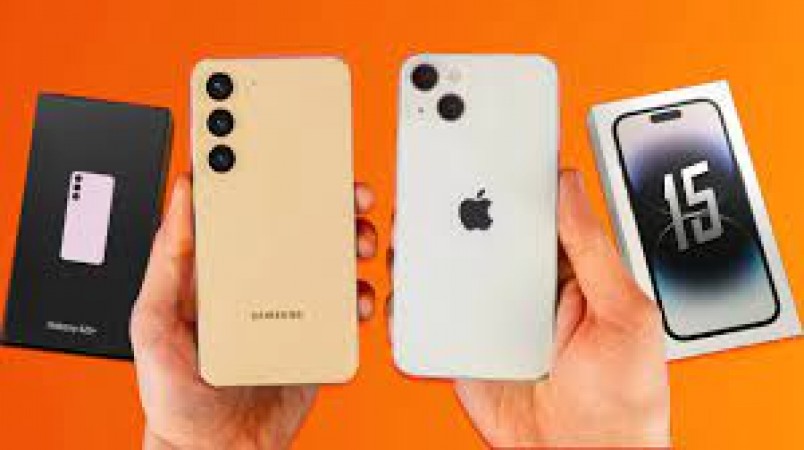
In the ever-evolving world of technology, two giants have dominated the market for years - Samsung and Apple. Both companies have a massive global fanbase and a fiercely loyal customer following. In this article, we will delve deep into the comparison between Samsung and Apple, analyzing their strengths, weaknesses, and what sets them apart in the highly competitive tech industry.
1. Company Background
1.1 Samsung
Samsung, founded in 1938 in South Korea, initially started as a small trading company. Over the years, it diversified its portfolio and ventured into various industries, including electronics, shipbuilding, construction, and more. Today, Samsung Electronics is one of the world's leading technology companies, producing smartphones, tablets, TVs, and other cutting-edge gadgets.
1.2 Apple
In contrast, Apple, founded by Steve Jobs, Steve Wozniak, and Ronald Wayne in 1976, is an American multinational technology company. Apple made its mark by revolutionizing the personal computer industry with products like the Macintosh and later expanded its lineup to include iconic devices such as the iPhone, iPad, and MacBook.
2. Product Range
2.1 Samsung
Samsung boasts an extensive range of products, catering to a broad spectrum of consumers. From the flagship Galaxy S series to the innovative Galaxy Fold and Galaxy Tab, Samsung offers options for every budget and requirement. Their diverse product lineup gives them a competitive edge over many competitors.
2.2 Apple
Apple, on the other hand, is known for its simplicity and focus on a limited product range. The iPhone remains their flagship product, and they continue to refine and improve it with each new iteration. Alongside the iPhone, Apple's ecosystem includes the iPad, Mac computers, and the Apple Watch.
3. Operating Systems
3.1 Samsung
Samsung predominantly uses the Android operating system, developed by Google, for its smartphones and tablets. The Android platform provides a high level of customization and access to a vast array of apps through the Google Play Store.
3.2 Apple
In contrast, Apple's devices run on the iOS operating system, which is exclusive to Apple products. iOS is known for its smooth user experience, seamless integration between devices, and a curated App Store with a strong emphasis on security and quality control.
4. Design and Build Quality
4.1 Samsung
Samsung devices often feature sleek and modern designs with premium materials. They are known for their stunning AMOLED displays and cutting-edge technology. However, some critics argue that certain Samsung models can feel plasticky compared to competitors.
4.2 Apple
Apple is renowned for its minimalist and elegant designs that prioritize user-friendliness. The company pays meticulous attention to detail, resulting in products that are visually appealing and exude a premium feel. The use of premium materials, such as aluminum and glass, further adds to Apple's reputation for excellent build quality.
5. Camera Capabilities
5.1 Samsung
Samsung has made significant strides in camera technology, equipping its flagship phones with top-of-the-line camera sensors and AI-driven features. Their focus on providing users with a versatile photography experience has earned them accolades in the smartphone photography arena.
5.2 Apple
Apple, too, places great emphasis on camera quality. With each new iPhone release, the company introduces innovative camera features and improvements. Apple's approach to photography centers on simplicity and producing exceptional results without overwhelming users with technical jargon.
6. Innovation and New Technologies
6.1 Samsung
Samsung has a reputation for being an early adopter of new technologies. They were among the first to introduce foldable smartphones, curved displays, and other cutting-edge innovations. This risk-taking approach has led them to be at the forefront of technological advancements.
6.2 Apple
While Apple may not always be the first to introduce new technologies, they excel at refining and optimizing existing ones. The company's focus on user experience drives their innovation, ensuring that new features seamlessly integrate into their ecosystem.
7. Pricing and Affordability
7.1 Samsung
Samsung offers a wide range of devices at various price points, making their products accessible to a broader audience. This strategy enables them to capture both the premium market and the budget-conscious consumer segment.
7.2 Apple
Apple's products are often perceived as premium and come with a higher price tag. However, the company justifies this with its reputation for quality and exceptional customer service. Apple appeals to customers who prioritize seamless integration and are willing to invest in the Apple ecosystem.
8. Brand Loyalty and Customer Base
8.1 Samsung
Samsung's global presence and diverse product range have contributed to a massive and diverse customer base. While they have a loyal following, it might not match the fervent fanbase that Apple commands.
8.2 Apple
Apple is renowned for its fiercely loyal fanbase, often referred to as "Apple enthusiasts." These customers often remain loyal to the brand and actively participate in the Apple ecosystem, owning multiple Apple products. In the epic battle of Samsung vs. Apple, both companies have carved out unique identities and enjoy tremendous success in the tech world. Samsung's diversity and innovation stand strong against Apple's focus on simplicity and user experience. Ultimately, the choice between the two tech giants boils down to individual preferences, needs, and brand affinity.
Productivity Tools and Apps to Improve Efficiency